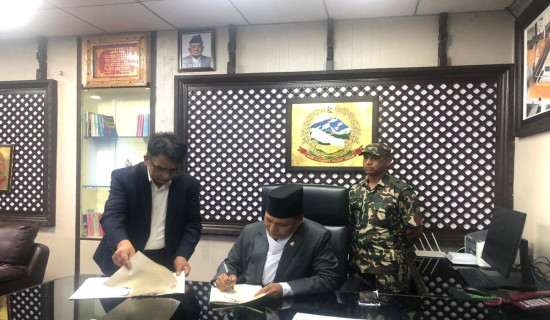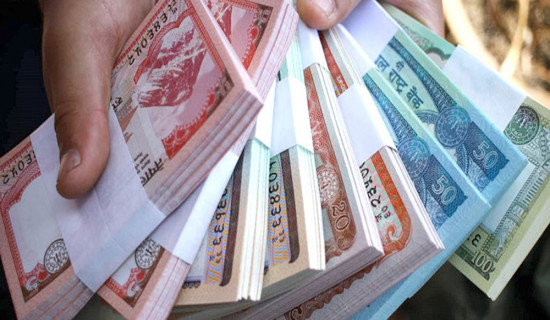- Tuesday, 16 September 2025
Human trafficking takes a heavy toll on indigent Nepali citizens
By Arpana Adhikari,Kathmandu, June 29: “They seized our passport and beat us when we refused to join their online scams. We were locked in a pitch-black, suffocating room, so small we couldn’t even stand upright. Insects swarmed us constantly. They threatened to kill us and we were barely fed, sometimes just once in two days. It felt like waiting to die.”
These are the words of 30-year-old Santosh and his friends Dinesh (27) and Saroj (23) from Bagmati Province (name and address of victims kept confidential at the request of police), recalling the nightmare they endured inside one of Myanmar’s notorious cyber scam compounds run by Chinese mafias.
The trio returned to Kathmandu this Wednesday after narrowly escaping the grip of a cyber slavery ring in Myanmar. On Thursday, they were seen at the Anti-Human Trafficking Bureau, Babarmahal, filing a complaint. Beside them stood their mothers, faces weighed down by sorrow, unable to fathom how anyone could endure what their sons had been through.
Exhausted and visibly shaken, with dark circles under his eyes, Dinesh recounted how they were deceived by his maternal uncle and his friend, Dhiraj Adhikari, of Narayangadh, Chitwan. Promised a high-paying cashier job in Laos with salary of US Dollar 1,000 a month, the three friends, unemployed and desperate for overseas work, agreed.
The agent asked them to pay Rs. 20,000 up front for visa processing and made them pay another Rs. 150,000 under various pretexts.
In Chaitra, they left for Thailand on tourist visa with forged documents arranged by Adhikari and later flew to Laos from Thailand. But once they arrived at a company in Laos, one of the Nepali workers warned them that company was running a scam, not the legitimate job they were promised.
He also suggested them to seek jobs in Thailand. Their agent agreed to take them back to Thailand, promising hotel jobs. He also charged them 1,000 US Dollars each to provide new jobs. The night they returned to Thailand, a Chinese man arrived to escort them. They travelled by van, motorbike through dense forest and finally crossed river by a boat, where they were assisted by army personnel.
Only after arriving at the compound, nestled deep in an isolated jungle surrounded by towering hills, did they realise the grim truth, they had crossed into Myanmar and the uniformed personnel were not Thai but part of the Myanmar military. A Nepali man who was trapped in the same company and later started working for them revealed that they had been sold to a company operating online scams.
Santosh said the Nepali man told them that those who refused to work or failed to meet targets were locked in dark rooms, beaten with rods, denied food and electrocuted. Escapees, he warned, risked being killed by the Burmese Army, which was paid Rs. 5,000 a month by the company.
When the trio initially refused to work, they were locked in a dark room and threatened with death, and they felt they had no choice but to comply.
For two months, the trio was forced to work 17-18 hours a day, operating fake Facebook, WhatsApp and Instagram IDs under names like Ruchi Pandey, Monica Sharma, Aruhi Sharma, Priyanka Arora, Soniya Patel and Priya Patel to trap Indian men.
Their job, Saroj said, was to make Indian clients fall for them and lure victims into online shopping or joining a fake networking business.
“Only when clients demanded video call did the company use real Indian models, otherwise, all chats were handled by the trafficked workers,” he added.
Saroj shared that they deliberately avoided convincing victims, not wanting others to suffer as they had. “We were punished for it,” he said, adding, “They made us carry water jars up and down the six-storey building, 200 rounds. If we failed, they beat us. I still can’t believe we made it out alive.”
Santosh recalled how their escape began. One day he discovered the phone code of a Nepali man working for the company. “While he was asleep, I sneaked into his room and used his phone to contact my family, who had been desperately waiting to hear from us after months of no contact.”
Then after, the families of Santosh, Dinesh and Saroj filed a complaint with the Anti-Human Trafficking Bureau seeking rescue of their sons. With support from the Nepali Embassy in Thailand, and after a month and a half, they were rescued and repatriated to Nepal via Bangkok.
“There were around 40 Indian nationals still working there,” Saroj added. “Each of us lost nearly Rs. 500,000 and went through unimaginable mental and physical torture. We’re filing this complaint so the agent responsible faces justice, and to stop others from suffering like we did.”
The trio are among a growing number of Nepali falling victim to traffickers exploiting dreams of foreign employment, only to trap them in modern form of digital slavery in India and South East Asia, including Myanmar, Thailand and Laos.
Multiple international news media outlets have recently uncovered a vast network of cyber slavery in South East Asia.
The Amnesty International has identified at least 53 scam centres, many combined with human trafficking, where victims, including minors are held in prison-like conditions and forced into schemes, like romance scams, phising, telecom investment swindles, celebrity-lottery deceptions, fake job offers, business-email compromises and charity frauds.
According to Anti-Human Trafficking Bureau, 30 Nepali nationals, including two females, have been rescued from Myanmar and nine men from Cambodia from the cyber slavery rackets.
However, the data doesn’t include the victims who were able to escape from the similar operation in Laos in 2022 and 2023 and recently rescued Nepalis who were held captive and tortured in Kashipur, Uttarakhand, in India, after being lured with promises of attractive jobs.
According to a statement issued by Nepali Embassy in India on June 21, 35 Nepali youth of various districts, who were taken to India after falling victim to a large-scale job fraud racket, had been rescued.
However, the Times of India (ToI) on Friday reported that about 57 Nepalis, including 12 minors were rescued.
The news portal further states that it is suspected that over 1,000 Nepalis are allegedly held captive in similar conditions in Uttarakhand, Uttar Pradesh and Bihar in an industry-scale job fraud being run by organised crime gangs.
According to the Bureau, agents were found contacting people through messaging apps and social media platforms, offering attractive jobs in India, such as security guard, supervisor and packaging roles, with promises of high salaries and benefit.
Individuals are deceived and taken across the border to places like Muzaffarpur and Rudrapur in India, where fake companies have been set up.
Victims are given fake documents, held in hostels, and made to undergo short training sessions. They are later pressured into paying large sums, sometimes up to INR 200,000, under the pretext of creating additional documents and gaining work experience.
The Bureau strongly urges the public not to fall for such promises or share personal information with unknown contacts over digital platforms.
Superintendent of Police and Spokesperson of the bureau, Narendra Kunwar said cyber slavery is an increasingly global form of organised crime where individuals are forced or deceived into performing online work under exploitive and abusive conditions.
Senior Superintendent of Police and Chief of the Bureau, Krishna Prasad Pangeni said that over the past four years, cyber slavery has become a growing problem for Nepalis being smuggled or trafficked abroad.
Rising human smuggling and trafficking disguised as visit visas
Recently, cases of Nepalis, especially young people, being illegally moved across borders to countries like US, European countries, Russia, the Middle East via Dubai and Southeast Asian countries via Thailand, by pretending to travel on visit visas are making headlines.
Many Nepali women are smuggled to Gulf countries under the guise of visit visas by fulfilling procedures of immigration office, where many were forced to face sexual and labour exploitations, said Govind Panthi, advocate and former DSP, who previously led an investigation into visit visas.
The government banned sending Nepali women as domestic workers to Gulf countries in 2016.
However, traffickers have continued sending them using various methods, in collaboration with travel agencies. They have made Dubai as transit point to transport people to Gulf countries, he added.
According to the Department of Immigration, from 2022 to 2024, a total of 657,256 people travelled abroad on visit visas. During the same period, 18,181 individuals were sent back from the airport.
In 2022, 177,310 people went abroad on visit visas and 4,293 were sent back. In 2023, 204,518 travelled and 4,883 were stopped, while in 2024, 274,428 have travelled and 1,005 have been turned away.
According to SP Kunwar, when individuals consent to illegal travel and those facilitating it profit financially, such acts are classified as human smuggling.
The Nepali nationals working abroad on visit visas is rising, but the government lacks accurate information about them. But the incident only comes to light after the individual experiences hardship, Kunwar said.
Advocate Panthi said the lengthy, complex process of obtaining labour permit and limited job opportunities drive many to go abroad on visit visas, despite the risk of being cheated.
The government introduced a six-point guideline on January 24, 2024, requiring specific documents for visit and tourist visas. However, traffickers often use forged documents with the help of travel agencies and manpower companies to send people abroad, he added.
The country’s recent scandal has shown how immigration office staff, security personnel, airline employees and travel agencies collude to carry out human trafficking under the guise of visit visas.
In July, 2023, a team of Kathmandu Valley Crime Investigation Office, led by Panthi had uncovered a large-scale smuggling operation involving fake documents, agents, consultancies, travel agencies, manpower companies, hotels, airlines, immigration officials, the Department of Foreign Employment and even some police officers.
“A total of 37 individuals, including 20 agents, 20 travel agencies, eight consultancies, political figures and officials were arrested and charged with human trafficking, forgery and organised crime,” he said.
After two years the case resurfaced. The Home Ministry summoned Tribhuvan International Airport’s (TIA) Immigration Office Chief Tirtha Raj Bhattarai on involvement in human trafficking under the guise of visit visas. Now the CIAA is leading the investigation.
The government has also formed a high-level study and investigation committee under the chairmanship of former Chief Secretary, Shanker Das Bairagi, regarding the scam.
Home Minister Ramesh Lekhak had mentioned that the committee was formed as per the commitment to take concrete initiative for policy-level, legal and structural reforms in order to resolve visit-visa related problems seen from the past.
“If thorough an impartial investigation is conducted into visit visa case, it is certain to cause major upheaval, something that has now emerged as a public outcry,” said Panthi.
According to him, the police headquarters had once deployed a team of the bureau to the TIA to combat human trafficking. However, it was removed following the protest from the immigration staff, in vested interest.
Nepal’s status of trafficking, smuggling and transportation
According to the Bureau, a total of 135 cases of human trafficking and smuggling were registered in Bureau and in Nepal Police in the fiscal year 2024/25.
Among the victims, 85 were women, 68 girls, seven were men, and one was a boy. Of the total cases, 59 were of prostitution, 27 of exploitation in foreign employment, four of human organ smuggling and 43 cases of human transportation.
In 2023/24, 170 cases were reported, with 123 women, 76 girls, and 17 men identified as victims. Similarly, in 2022/23, 163 cases were recorded, involving 133 women, 80 girls, 18 men, and one boy.
Meanwhile, in 2024/25 total 799 people were rescued by Nepal Police, total 506 people in 2023/24 and 252 in 2022/23. A total of 1,986 people were rescued within last six years.
Similarly, as of mid-June this fiscal year, a total of 4,914 cases related to foreign employment fraud were registered at the Department of Foreign Employment (DoFE), out of which 208 cases have been filed in court and total 113 people were rescued from abroad.
Nepal demoted to Tier 2 Watch List
The trafficking in persons report of the USA downgraded Nepal from Tier 2 to the Tier 2 Watch List, citing its failure to criminalise all forms of trafficking, prosecute offenders, support victims, support Nepali migrants abroad and regulate labour recruiters.
If Nepal fails to meet specific benchmarks, it faces a further downgrade to the Tier 3 category. If this happens, then the country may lose key international aids.
The report urges Nepal to align its anti-trafficking laws with the UN’s Palermoo Protocol, which is ratified in 2020. But the country is yet to implement it, leaving justice systems and survivors without critical support.
Hurdles to combat human trafficking/smuggling/transportation
Nepal has introduced some laws, regulation and action plans to combat human trafficking and has also ratified some international treaties.
There are Human Trafficking and Transportation (Control) Act, 2007, Nepal Immigration Act, 1992, Foreign Employment Act, 2007, and Penal Code, 2017. Nepal has also ratified the UN Palermo Protocol in 2020, committing to prevent, suppress and punish trafficking.
The Human Trafficking and Transportation (Control) Act has made provision of severe penalties ranging from 10 to 20 years imprisonment and fines of up to Rs. 200,000 depending on the offense.
However, the country has yet to fully harmonise its domestic laws with this protocol, said Panthi.
Nepal also lacks clear distinction between human trafficking and human smuggling in legal definition, he added.
The law assigns the responsibility of investigating foreign employment fraud to the DoFE.
Panthi said, “Civil servants are not equipped with the skills or training required for criminal investigation that are exclusive of Nepal Police.”
Bureau Chief SSP Pangeni also confirmed that police lack the legal authority to file foreign employment fraud cases, as the law grants full jurisdiction to the DoFE.
Due to this over 30,000 such cases are currently pending there.
Panthi called upon to amend the Foreign Employment Act, 2007 to grant investigation authority to the police, who have nationwide presence.
“If the investigation authority is granted to the police, it is likely that they would deliver better results than civil servants and victims have better access to justice,” said SSP Pangeni.
Explaining the shortage of manpower to handle the backlog of cases in the department, DoFE Director Tika Ram Dhakal said discussions are ongoing to collaborate with the Nepal Police to investigate the cases filed in the department.
















